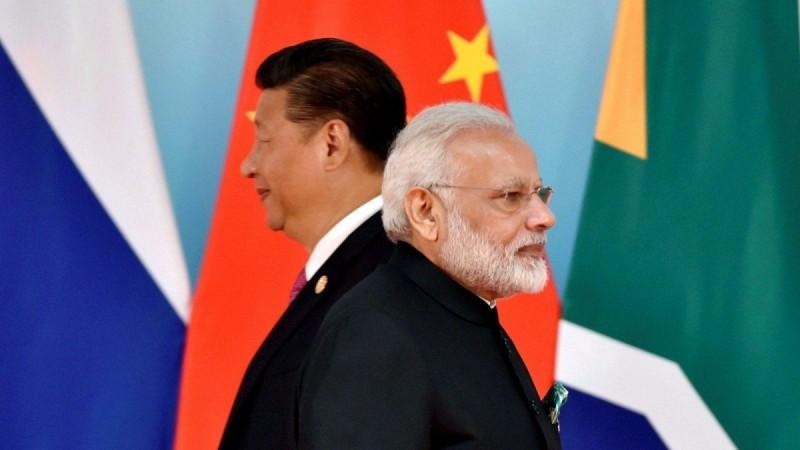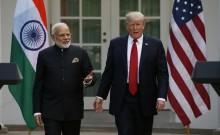
While the relations between the two countries have been sour over numerous issues, India and China have decided to pursue 'fair' solutions as both the country leaders meet at the Shanghai Cooperation Organisation (SCO) on Friday, June 14.
The summit, scheduled to take place in Bishkek, Kyrgyzstan, from June 14-15 is the first time the country leaders will meet since PM Modi was re-elected after the recent Lok Sabha elections.
The Secretary-General of SCO, Vladimir Norov, had reportedly hinted that the forum will focus on deepening multilateral cooperation and issues such as drug trafficking, IT cooperation, environment concerns and healthcare. It is also reported that the issue of terrorism will most likely be approached regarding the situation in Afghanistan. It is doubted that the stewing militancy in Pakistan will be discussed in the forum.
The meeting also comes months after India rejected China's official invitation to attend the Belt and Road Initiative (BRI) forum in April for the second time. India had rejected a similar request in May 2017 when 129 countries had attended the gathering in Beijing.
India's firm reservation to the Chinese strategic initiative, especially the Bangladesh-China-India-Myanmar (BCIM) economic corridor was, according to some analysts, the first setback in its ambitious plan of projecting itself as the global leader via the BRI project.
The proposed BCIM corridor is 2,800 km long and is designed to link Kunming in China's Yunnan province by passing through Mandalay in Myanmar and Dhaka in Bangladesh before heading to Kolkata.
While the BCIM was initially excluded, according to its official website, from the list of projects under the BRI after India's non-cooperation, a report titled, "The Belt and Road Initiative Progress, Contributions and Prospects," released by Communist Party of China (CPC) on April 22 included the BCIM as a BRI project, reported The Hindu.
But it was not just the BCIM that New Delhi had a problem with. The decision to not cooperate was made after China made multiple attempts to block India's bid to declare Jaish-e-Mohammed chief Masood Azhar a global terrorist at the UN despite the Pulwama attacks in February.
India's relation with China is intertwined with the country's strategic plans of opening economic corridors through its ambitious plans of creating a modern silk route. The three major undertakings in its South-Asian initiatives are the China-Myanmar Economic Corridor (CMEC), the Nepal-China Trans-Himalayan Multi-dimensional Connectivity infrastructure including Nepal-China cross-border railway and the China-Pakistan Economic Corridor (CPEC).
It is the CPEC that has made India wary the most, due to its geopolitical strategic borders that India shares with both the China and Pakistan.
Doklam standoff
The territorial dispute between India and China had resulted in military aggressive retaliation since the 1962 Sino-Indian war. While military tensions regarding border have continued ever since it was the recent escalation of tensions between both the countries in 2017 that prompted international discussions regarding the possible consequences of a war between two nuclear countries.
On June 30, 2017, Chinese troops started constructing a motorable road from Dokola in the Doklam area towards the Bhutan Army camp at Zompelri. The Ministry of Affairs, in its official statements, said that the intrusion in the area, being is a tri-junction border according to a 2012 agreement between the two countries, was illegal, a violation of its territorial sovereignty and UN Charter and a posed a security threat to India.
To stop the Chinese troops from constructing the road, a reported 270 Indian troops, with weapons and two bulldozers had entered Doklam.
The Ministry of Foreign Affairs of China released a document in August 2017 claimed that China had notified India regarding its plan to construct the road in advance "in full reflection of China's goodwill".
After 73 days, on August 28, 2017, both the countries agreed to disengage from the border standoff.
India-China trade
Amid the waging trade war between the US and China, India has expressed its concern but continues to maintain its confidence in its ability to deal with the issue without leaning heavily on either side.
While China is the biggest trading partner of India, what has concerned economists is the widening trade deficit that India has with China.
Official data from India's Commerce Ministry state that India's bilateral trade with China amounted to $84.44 billion in 2017. The trade deficit was reported to be an estimated $52 billion.
In 2018, India's exports to China was $16.5 billion. Its imports to Hong Kong was $13.3 billion dollars. These two figures combined made for a $900 million loss for India, according to a recent analysis by The Mint.








